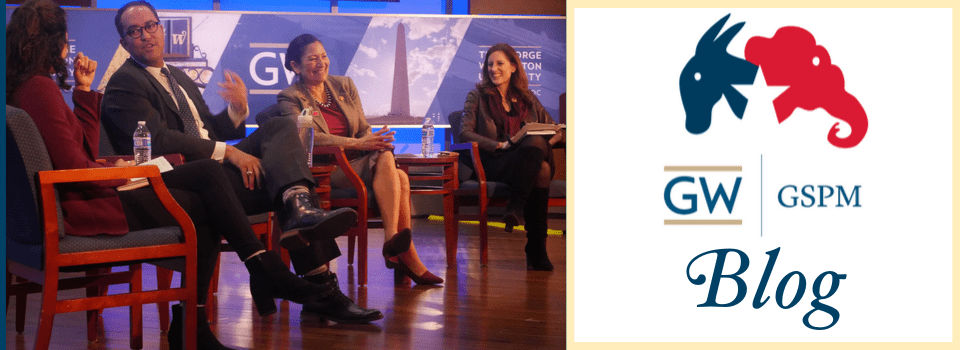Perseverance is the key to success. The COVID-19 pandemic has changed the patterns of work and life, disrupted travel—international travel in particular, physically separated families and colleagues, and tested the strength of the global economy and global ties in general. And yet, the global politics programs of the Graduate School of Political Management (GSPM) have continued, and its international partnerships have endured.
GSPM’s cooperation with government officials and civil society of Georgia—a strategically important country where Europe meets Asia—represents an excellent showcase. In May of 2020, at the beginning of the pandemic-related lockdowns, instead of travel to Georgia—as part of the Global Perspectives Residency—the immersion program went virtual. H.E. Ambassador David Bakradze and our partners—Sector 3 – Hub for Development, Center for Development and Democracy, and Endowment “ProDemos”—helped assemble an impressive online program. VIP participants in the four-day E-Residency included Archil Talakvadze, Speaker of the Parliament of Georgia; Kakha Kuchava, Deputy Speaker of the Parliament of Georgia; Levan Davitashvili, Minister of Environmental Protection and Agriculture; and Mariam Kvirishvili, Head of the Tourism Administration.
The July 14th GWU session held under the title US Democratic Leadership and Global Diplomacy is a recent example of GSPM-Georgia cooperation. As part of the GSPM Summer Series and the DC Residency, that is, a program on Washington politics, this session brought as panelists former Representative Loretta Sanchez and Giorgi Tsikolia, Deputy Chief of Mission at the Embassy of Georgia to the US. Open to the GWU community and attended by our Georgian civil society partners, the session was moderated by Professor Alexander Downes from the GWU Elliott School of International Affairs.
Responding to the moderator’s question about the importance of democracy promotion in the hierarchy of the US foreign policy objectives, Mr. Tsikolia emphasized that “without democracy, it is not possible to build a prosperous state” and characterized the US support of fledgling Georgia’s democracy as bipartisan and transformative. The cited evidence included the US investment of $4 billion in Georgia in the last two decades, which facilitated progress in economic development as well as judicial and electoral reforms. USAID programs on the environment, education, gender equality, and support of democratic reforms as well as investment from the US International Development Finance Corporation are essential for sustainable development and Georgia’s full integration in the Western institutions, which is vigorously pursued by the Georgian leadership.
On the subject of the role of the military force in the promotion of democracy, Mr. Tsikolia underscored the importance of NATO in ensuring the global security architecture and Georgia’s successful fulfillment of requirements for membership in this organization. “We need to defend ourselves, to deter aggression,” – said Mr. Tsikolia, referring to the Russian military aggression against Georgia in August of 2008 and subsequent illegal occupation by the Russian Federation of Georgian regions of Abkhazia and Tskhinvali region/South Ossetia. He also noted the participation of the Georgian military in the global fight against terror, including the missions in Afghanistan and Iraq, in which 32 Georgians lost their lives. For Georgia, safeguarding the liberal world order is crucial: it mitigates external threats and allows devoting more resources to developing economy and society.
Some of the attending students were wondering whether diplomacy should change as the world changes: cyberattacks, including ransomware attacks, proliferate, and the threats from non-governmental actors can be no less significant than those from superpowers. Mr. Tsikolia acknowledged dramatic changes in the global economy and lifestyle due to the expanded access to new technologies. He also pointed to the challenges that diplomats experience because of heightened publicity and quick travel of information. To confront these challenges and address both national and global priorities in a timelier and more effective manner, international institutions—from NATO to the International Financial Institutions and the World Trade Organization—are critical, stated Mr. Tsikolia. He also welcomed informal, frank dialogues like the one to which he contributed—as an opportunity to engage young people in the discussion about modern ways of conducting diplomacy in adaptation to the evolving global landscape.
For young political professionals and students of American politics and policies, understanding global politics and international affairs is imperative. In recognition of this reality, GSPM offers a Global Politics concentration and a Global Public Relations certificate. An unparalleled GSPM alumni network—spanning from the Pentagon and Capitol Hill to the world’s capitals—testifies to the value of a global outlook for skills and influence in public relations, legislative affairs, and political management for the benefit of all.
GSPM’s partnership with Georgia and Georgians is part of the school’s agenda for success of its students and alumni. Notwithstanding the pandemic and related difficulties, this partnership will persevere, and we hope that the next Global Perspectives Residency about Georgia will include a trip to Tbilisi and in-person meetings with our colleagues, friends, and new acquaintances.
Dr. Natalia Dinello is the Director of the Global Residencies Program at the George Washington University Graduate School of Political Management.

